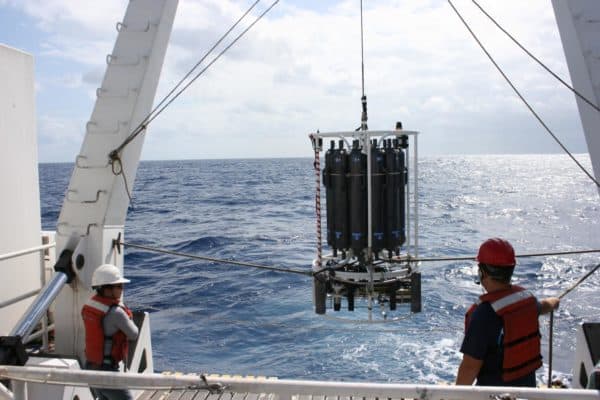

Two new types of warm water phytoplankton have been discovered in the waters of climate-sensitive regions of the world’s oceans, and their finding has led scientists to conclude that these species will likely become more abundant as global warming progresses.
Chlorophyll-rich phytoplankton represent the base of the ocean food chain, with many aquatic species like whales, shrimp and jellyfish using it as a primary food source. But the presence or absence of phytoplankton in a particular region of the ocean is closely regulated by ocean temperatures, with cooler rather than warmer waters being the preferred environment for the production of phytoplankton blooms.
Research has shown that the warming of the oceans is decreasing the amount of phytoplankton, a process known as ocean desertification. Not merely a problem for the ocean species dependent upon phytoplankton, ocean desertification is doubly damaging, as phytoplankton currently serve as half of the planet’s biological carbon dioxide uptake -about 100 million tonnes of carbon dioxide per day are extracted from the atmosphere by phytoplankton. Thus, decreasing concentrations of phytoplankton due to warming surface waters are said to be themselves contributing to a speed up of global warming.
The new findings published in the journal Current Biology may point to a different scenario, however, as scientists have identified two new types of phytoplankton which are now proliferating in warmer, low-nutrient surface waters in diverse regions around the planet, including the Sargasso Sea in the North Atlantic, the Bay of Bengal off the coast of India and the North Pacific Gyre, all of which were found to contain the new species.
“These new phytoplankton appear to thrive in the world’s most desert-like waters where most other eukaryotic species decrease,” said Alexandra Z. Worden, a senior fellow at the Canadian Institute for Advanced Research and team lead on the new study.
Researchers produced genetic maps of the aquatic microbial environment, involving more than 6,000 full-length RNA sequences sampled from the same locations over a number of years. With this data, the team was able to produce an overall picture of how phytoplankton species have either proliferated or died off in different regions over different times of the year and over years at a stretch.
“To understand future oceans one-off sampling won’t work. If we had taken one snapshot of the ocean in spring we would have thought these phytoplankton didn’t matter, but because we kept going back we realized they are important -it takes year-round sampling of the seasons to see that,” says Worden.
With the discovery of these new species -and particularly, the finding that they are currently on the rise in our oceans- the team sees their work as helping to fill in the knowledge gaps on how global warming over upcoming years is likely to impact the world’s oceans.
“How the newly discovered phytoplankton lineages contribute to food chains and vertical carbon export to the deep sea remains unknown,” say the study’s authors, “but their prevalence in expanding, low nutrient surface waters suggests they will have a role in future oceans.”
Leave a Reply
You must be logged in to post a comment.




 Share
Share Tweet
Tweet Share
Share




Comment